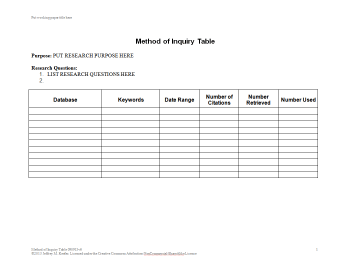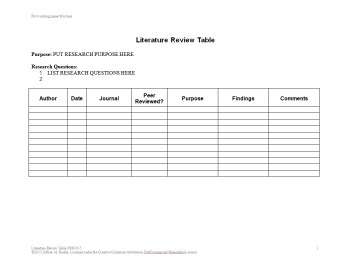UPDATED on September 22, 2013:

These tools were again revised, with the current version on my Research Tools page.
Feedback is always appreciated.
ORIGINAL POST:
In my ongoing work to help my graduate research students better understand, assess, and use research, I have updated two tools to help navigate and track the literature. As I recently did with my Research Evaluation Tools for Articles in the Social Sciences, I am also seeking feedback and help with getting these specific enough to be useful, though broad enough to be flexible.
The Method of Inquiry Table is meant to track what databases or sources are queried to ensure completeness and a systematic approach to the literature. As is often the case, when we search the database resources, we are not always systematic in the ways we track what we find, and in the process run the risk of searching one database for some keywords, while accidentally omitting the same process elsewhere.
 The Literature Review Table is for the next step, namely once we find literature and have read some of it. Who can remember everything we read, and what we find valuable and want to use in parts of our write-up? That is what this tool is for, so we include in it aspects of our work for what we find when we evaluate the literature.
The Literature Review Table is for the next step, namely once we find literature and have read some of it. Who can remember everything we read, and what we find valuable and want to use in parts of our write-up? That is what this tool is for, so we include in it aspects of our work for what we find when we evaluate the literature.
I have used these two tools before, and now want to share them in the spirit of gathering feedback to improve them so they more readily meet the needs of developing researchers. Feedback, suggestions, and comments are most appreciated in this mini-project.
Thanks in advance.
 I have been tossing around this idea in various forms for some time now, and find a number of influences–Twitter Journal Club, #CLmooc (we make learning!), Shut Up And Read!, That new habit, and even #365Papers–all of which revolve around sharing some of the really great reading we do with others, specifically the academic, research-oriented reading we (I?) frequently do in silence.
I have been tossing around this idea in various forms for some time now, and find a number of influences–Twitter Journal Club, #CLmooc (we make learning!), Shut Up And Read!, That new habit, and even #365Papers–all of which revolve around sharing some of the really great reading we do with others, specifically the academic, research-oriented reading we (I?) frequently do in silence.




